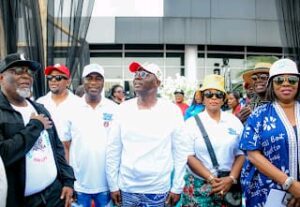Court dismisses suit seeking to stop Buhari from delegating powers to control NDDC
A Federal High Court, Abuja, on Wednesday dismissed a suit seeking to stop President Muhammadu Buhari from delegating powers to control the Niger Delta Development Commission (NDDC) to the minister, Ministry of Niger Delta Affairs.
Justice James Omotosho, in a judgment, dismissed the suit for lacking in merit.
Justice Omotosho held that Section 23 of the NDDC (Establishment) Act gave the president the powers to give directives to the commission and it shall be bound by such orders.
He also held that going by Section 7(3) of the Act, the direction and control of the commission was placed firmly under the control of the president.
According to him, this means that the 1st defendant (president) can override the powers and functions of the commission.
The judge said the provision gave the president wide powers to oversee the management of the commission.
The News Agency of Nigeria (NAN) reports that President Buhari had, through a letter dated Sept. 2, 2019, delegated his powers to give directives to the Minister of Niger Delta Affairs.
The letter read in part that based on Section 7(3) of the NDDC Act, the president directed the Board and Management of the commission to carry out their activities under the supervision of the ministry.
But Oladimeji Ekengba, the plaintiff and a legal practitioner, sued the president, the Attorney-General of the Federation (AGF), minister, Niger Delta Affairs and the permanent secretary as 1st to 5th defendant respectively.
Ekengba, an indigene of Imo, a member state of NDDC, while stating the facts leading to the case, said the president by the letter, had amended the commission’s Act.
He said despite the clear provisions of the NDDC Act, President Buhari, by an administrative fiat, amended the provision of Section 2 of the commission’s Act by
“appointing 3rd to 5th defendants as governing board members of the NDDC without amending it to include the persons mentioned in Section 2 of the Act.
He said in carrying out the unconstitutional fiat, the 3rd to 5th defendants wrote to NDDC seeking to interfere and usurp the power of its board on Aug. 8, 2022 requesting for personnel audit and biodata of the commission.
He averred that the 3rd 5th defendants, through the minister (3rd defendant), inaugurated a committee on the comprehensive staff audit of the commission and communicated to the management of the commission vide a letter dated Aug. 15, 2022.
He also averred that the minister, on Aug. 17, 2022, issued directive on the day-to-day running of the commission to the director of ‘Community and Rural Development, requesting for the programmes of the commission in breach of statutory provisions, saying it was the duty of the court to rectify these breaches.
In the originating summons dated Aug. 19, 2022, sought a declaration that by virtue of the provision of Section 4 of the 1999 Constitution (as amended) and the provision of Section 2 of the NDDC (Establishment, etc) Act 2000, President Buhari cannot amend the provision of the commission’s Act by administrative fiat.
The lawyer then prayed for an order of perpetual injunction restraining the minister, the ministry and the permanent secretary from interfering, usurping, controlling or issuing directives to the management committee, staff or employees and intervening in the affairs of the commission contrary to Section 4 of the Constitution and the provision of Section 2 of the NDDC Act.
However, in a joint preliminary objection field before the court, President Buhari and the AGF, Abubakar Malami, SAN, disagreed with Ekengba.
They argued that the control and administration of the NDDC was under the president.
They sought an order striking out the suit for want of jurisdiction on the grounds that the plaintiff lacked locus standi to institute the suit and for failure to depose to an affidavit of non-multiplicity of suits as provided by the rules of this court.
Besides the 3rd to 5th defendants also filed a counter affidavit asking the court to strike out the matter.
Justice Omotosho held that from the tenor of Buhari’s letter, it was clear that the intention of the president was not to amend the Act but to delegate his powers to the minister to act on his behalf.
“The lst defendant (president) is well within his powers to delegate the powers.
“However, the 3rd defendant cannot go beyond the statutory powers of the 1st defendant.
“Delegation of powers implies the transmission of powers to another authority or person,” he said.
According to the judge, it appears to this court that by the provision of Sections 7(3) and 23 of the NDDC Act, the lawmakers intended for the commission to be under the Presidency being an interventionist agency.
He disagreed with Ekengba that the president’s letter amounted to an administrative fiat to amend the provisions of the commission’s Act.
“Only the National Assembly can make and amend statutes and not the President.
“In this case, the president simply exercised his powers of delegation by putting the 3rd defendant in charge of supervision and management of the commission.
“Also to put the supervision of the commission under the ministry of Niger Delta Affairs, this to the court does not amount to amendment or usurpation of the powers of the board of the commission.
“Executive powers are vested in the President of the Federal Republic of Nigeria and in exercising those powers can delegate same to the Vice President, Ministers or officers in the public service of the Federation under Sections 5 (1) & (2) and 148 (1) of the 1999 Constitution,” he said.
The judge, consequently, dismissed the suit for lacking in merit.




